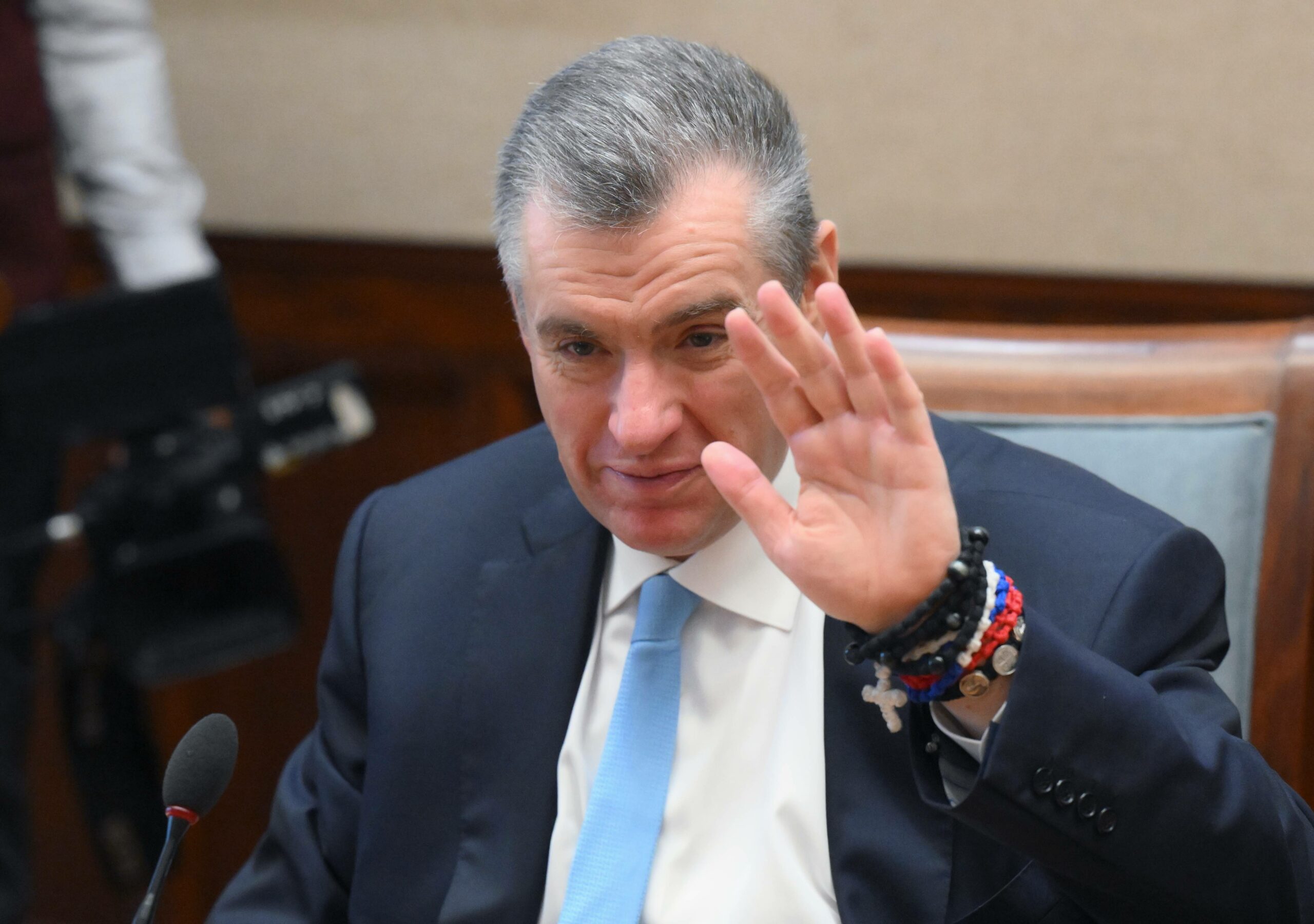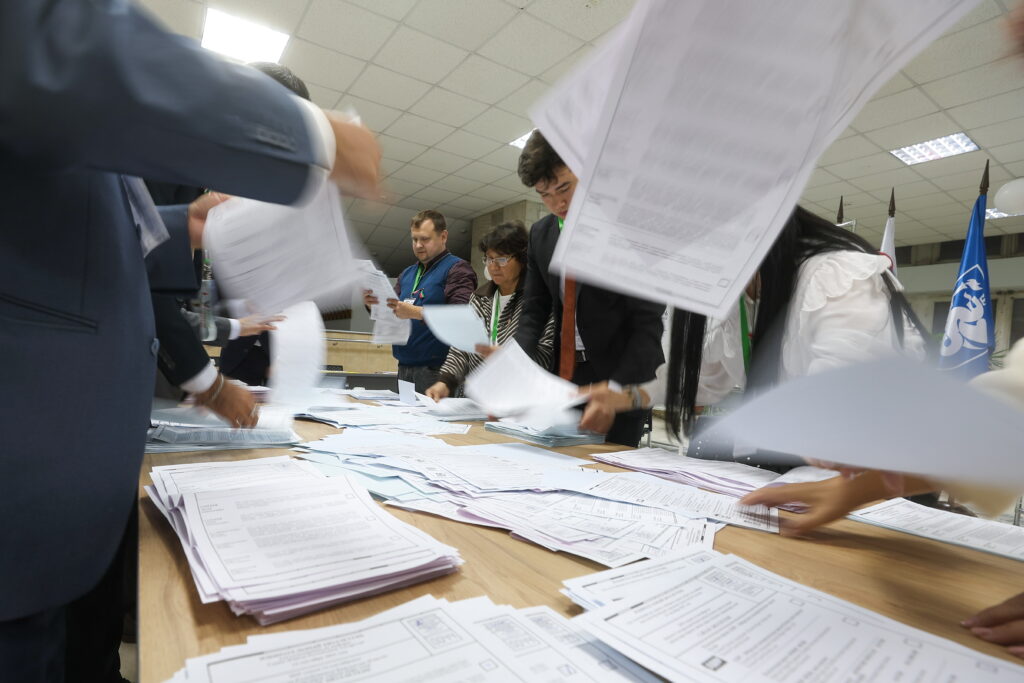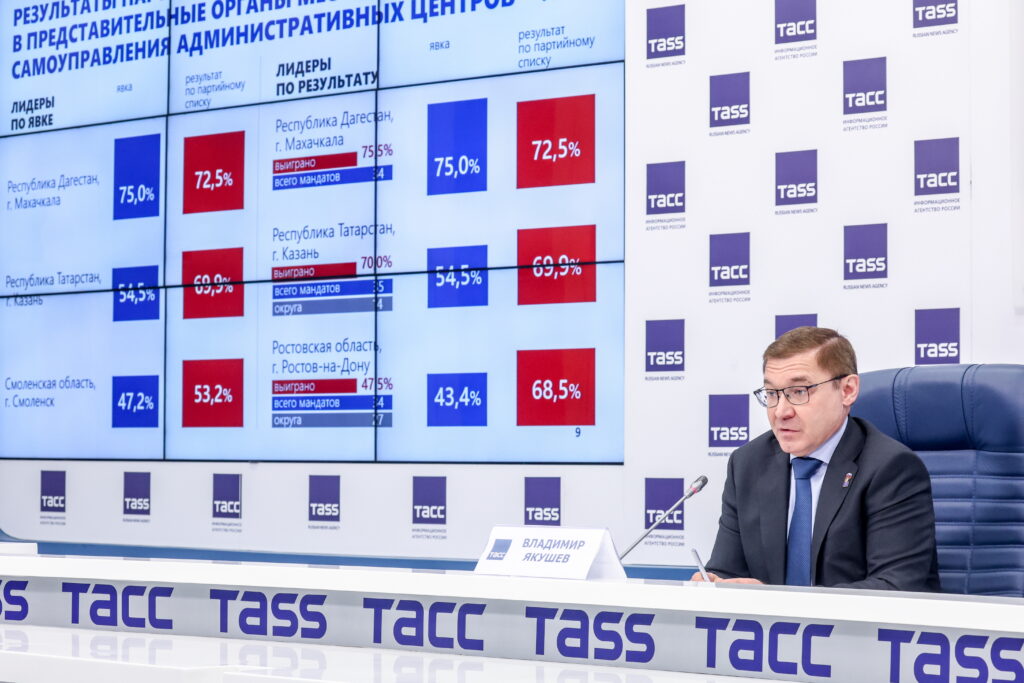The recent congresses of the Liberal Democratic Party of Russia (LDPR) and «New People,» held in the past few months, have outlined new rules for interaction between systemic parties and the presidential administration. Connections that were previously kept under wraps are now being publicly emphasized. At these events, Sergei Kiriyenko, the head of the political bloc of the Presidential Administration (PA), speaks and sets out goals and tasks for the parties. Federal officials are present in the audience, while party members assign an honorary role at the congresses to participants of the war with Ukraine. The Kremlin’s political bloc no longer hides—and even underscores—that it is turning systemic parties into projects designed to channel the votes of specific societal groups. These structures are left with virtually no interests of their own. This dependency will form the basis of the rules of the game for the 2026 State Duma elections.
«Today, as our president has repeatedly stated, at a time of challenge facing our country, the consolidation of all healthy, patriotic political forces is extremely important. The LDPR has rightfully been, is, and, I am confident, will continue to be one of these system-forming, state-patriotic forces,» Kiriyenko declared at the LDPR congress. He noted that Zhirinovsky’s party came in second, after United Russia, in terms of mandates won in last year’s regional elections. Kiriyenko added that the LDPR «is doing significant work to assist» war participants and their families, «contributing to bringing our common victory closer.»
For «New People», the first deputy head of the presidential administration had different words. «Over the past period, your party has established itself as a constructive political force, representing the interests of a significant number of voters—energetic, creative, engaged individuals with a responsible civic stance,» Kiriyenko said at the party’s congress. According to him, «New People» has «always supported Vladimir Putin on fundamental issues» and has «become an elevator that has helped involve people in politics who had never engaged in it before.»
Neither Kiriyenko nor his predecessors as heads of the PA’s political bloc—Vladislav Surkov and Vyacheslav Volodin—had previously attended the congresses of systemic opposition parties. At United Russia congresses, Kremlin overseers might have been present, thereby emphasizing that it is the ruling party. The LDPR, Communist Party of the Russian Federation (KPRF), and A Just Russia had long been in dialogue with the PA and were largely managed by it: they could tone down sharp opposition rhetoric when needed or refrain from nominating candidates undesirable to the Kremlin. However, party leadership consistently denied and distanced itself from this manageability. The leaders of «New People» acted similarly, even though this project was created with the support of the PA’s political bloc and figures from Vladimir Putin’s inner circle, such as the Kovalchuk brothers.
Parliamentary parties had traditionally relied on the support of an electorate dissatisfied with the Kremlin and United Russia for various reasons. Direct affiliation with the authorities harmed them, and presidential administration officials understood this. Both sides benefited from positioning the LDPR, A Just Russia, KPRF, and «New People» as opposition: party members gained votes from a portion of disgruntled voters, while political administrators channeled protest votes toward systemic, Kremlin-friendly forces. Thus, just a few years ago, it was hard to imagine the head of the PA’s political bloc attending the congress of any parliamentary party other than United Russia.
Kiriyenko is breaking this rule, signaling that new laws are now at play in the Kremlin’s relationship with systemic parties. It is no coincidence that the head of the political bloc calls the LDPR a «state-patriotic force» and discusses the tasks of the Liberal Democrats and «New People.» He openly issues directives, and his presence is portrayed by pro-government media and experts as a sign of special favor and approval—a guarantee of securing a place in the next State Duma. Party leaders Leonid Slutsky (LDPR) and Alexey Nechayev (New People) accept these rules, recognize Kiriyenko as their superior, and even echo his words in their speeches.
Other federal officials are also making appearances at party events. Deputy Defense Minister Anna Tsivileva, Vladimir Putin’s niece, attended the LDPR forum «Shoulder to Shoulder.» Sergei Gorkov, head of Rosgeologia, a former deputy economic development minister, and ex-vice president of Sberbank, attended the «New People» congress. While Gorkov was merely present in the audience, Tsivileva took the stage and delivered a speech.
The appearances of Sergei Kiriyenko and other officials integrate the systemic opposition—represented by the LDPR and «New People”—into the power vertical. Previously, party members distanced themselves from state officials (except when those officials came from the party) to maintain an image of opposition. Now, that need has vanished: the presence of figures from the power vertical is highlighted and clearly considered an honor.
So far, the LDPR and «New People» have embraced the new rules. Both parties can now be called projects of the PA’s political bloc. «New People» was created with its support for the 2021 State Duma elections to target the urban electorate with relatively liberal views. The Kremlin rebooted the LDPR after Vladimir Zhirinovsky’s death, with the political bloc installing Leonid Slutsky—a figure quite distant from the LDPR’s core—as party chairman. He used the party as a platform to enter the State Duma. The administrators adopted a tactic long used by the Kremlin when appointing outsider governors. Such outsiders, surrounded by unfamiliar and often hostile local elites, have no choice but to rely on the PA’s help and support. Slutsky became such an outsider for the LDPR. He spent a long time sidelining politicians close to Zhirinovsky (e.g., Yaroslav Nilov and Alexey Didenko), who had and still have their own opinions on whether Slutsky deserves leadership. Without external support and the PA’s sanction, the party chairman would quickly lose his position, making him willing to fulfill any wish of the political bloc. Both «New People» and the LDPR have sufficient ratings to enter the State Duma. The same cannot be said for A Just Russia, whose fate is currently being decided in the Kremlin. The PA may not drag a declining structure into the State Duma. In that case, Kiriyenko’s presence at an A Just Russia congress would be unnecessary. However, if the political bloc or Vladimir Putin decides that the party is needed in parliament, Kiriyenko will attend and set goals and tasks for it. The party’s leadership has long been loyal to Putin and the Kremlin, supporting all their initiatives and even outpacing them in ultra-patriotic fervor. Historically, A Just Russia is an artificially created Kremlin project from the era of Vladislav Surkov’s oversight, so adapting to the new rules would be very easy for it.
The relationship between the PA’s political bloc and the KPRF is more complex. Unlike «New People,» A Just Russia, and the current LDPR, the Russian Communist Party is not a Kremlin project but a structure that emerged in the 1990s, positioning itself as the successor to the Soviet Communist Party. Overall, the party is fairly loyal to the regime: the communists support the war, and their leader Gennady Zyuganov values his personal ties with Putin. Thanks to these ties, the KPRF can afford some defiance—such as nominating candidates undesirable to the PA’s political bloc in gubernatorial and State Duma elections or clashing with Kremlin political managers, even making direct jabs at Kiriyenko. «Let’s invite Kiriyenko to the Duma again if necessary. Let’s discuss what’s happening with our elections. They cannot be legitimate if the voting process is stretched over three or four days and the vote count is effectively uncontrolled. Citizens demand proper elections, and we are ready to defend that position!» Zyuganov fumed from the Duma rostrum in January this year. Such behavior and unpredictability do not suit the political bloc, which seeks to strip the KPRF of its status as Russia’s second most popular party. As long as Zyuganov leads the KPRF, a speech by Sergei Kiriyenko or the presence of officials at its congress seems highly unlikely.
Let’s try to define the PA’s new rules for the systemic opposition. The Kremlin’s political managers view the party system as an appendage of the PA, an extension of the «big political bloc» with its personnel academies and structures like the Internet Development Institute or non-profit «Dialogue.» Kiriyenko is introducing corporate governance practices into politics, and in his worldview, parties must also fit into them if they are to be called «systemic.» Ahead of the 2021 elections, the political bloc already attempted to reshape the party landscape by creating several new political projects targeting different societal and electoral groups. These included «New People,» alongside the Party of Direct Democracy, Green Alternative, Zakhar Prilepin’s For Truth party, and a revamped Pensioners’ Party. According to Kremlin overseers, these projects, aimed at different groups, were meant to work with those audiences, manage them, and channel sentiments in a direction favorable to the PA, creating an illusion of representation in parliament. All this was intended to preempt serious protests. Most of these projects, except «New People,» failed to reach Duma heights. Moreover, Vladimir Putin’s ultra-conservatism implies a need to preserve familiar figures or at least structures. Thus, the PA opts to reformat existing parliamentary parties. Zhirinovsky’s death allowed the LDPR to be turned into a «project.» «New People» and A Just Russia, as artificial entities, were already primed for changes to the rules of the systemic opposition’s existence.
Currently, systemic opposition structures must become autonomous non-profit organizations (ANOs) within the broader political bloc system: ANO LDPR, ANO «New People,» and ideally ANO KPRF. If the Kremlin manages to retire Gennady Zyuganov before the State Duma elections and replace him with a younger manager (e.g., First Deputy Chairman Yuri Afonin), the communists will also fit into the new order. Each «party ANO» will work with its electoral group that does not want to support United Russia. The LDPR will target pro-war ultra-patriots or people who vote for the Liberal Democrats to quietly defy United Russia without much thought about the party’s politics. «New People» will focus on the urban electorate, and the KPRF on elderly voters. To attract public attention, parties are allowed to recruit celebrities—singer Grigory Leps joined the LDPR, and TV host Anfisa Chekhova joined «New People.» Such recruitment is part of the new set of unwritten party rules. Celebrities are mostly apolitical and can draw attention only with their name and face. A Just Russia has yet to find its place in this picture: it competes with the LDPR for «ultra-patriotic» votes, hindering the political bloc’s efforts to elevate the LDPR to second place. However, if the political bloc manages to bring the communists into line, the issue of displacing the KPRF from second place will also resolve itself. For the PA, it won’t matter much which of its controlled party ANOs has a slightly higher percentage.
The PA’s political bloc cannot entirely abandon the party system for several reasons. The most significant is the constitutional provision for a parliament whose deputies are elected competitively, including via party lists. Vladimir Putin is accustomed to the familiar set of parties and regularly meets with faces he knows. During Soviet times, the Russian president worked in the GDR, a state with a quasi-multiparty system where parties were loyal to the country’s leadership and the USSR, so Russia’s «diversity» of systemic opposition is familiar to him. For the political bloc, managing the party sphere is another way to prove its necessity and indispensability to the head of state, which is why Kiriyenko’s team also needs parliamentary opposition.
The parties themselves can hardly resist the new rules. Previously, they had to at least formally position themselves as opposition to win the trust of voters dissatisfied with the authorities. Now, the electorate itself matters less in the electoral process. What matters more is the favor of the political bloc’s officials and its leader, whom they are happy to see at their congresses. The LDPR and «New People» are already operating under the new scheme, and most likely, the other structures will follow suit. However, if the regime begins to shift toward greater political freedom—even while preserving key elite groups—these party ANOs, accustomed to following orders from above, will find themselves vulnerable in conditions of even limited competition.










